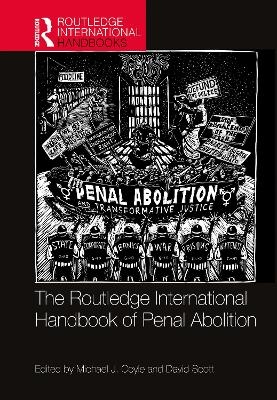
The Routledge International Handbook of Penal Abolition
Routledge (Verlag)
978-0-367-69329-9 (ISBN)
The Routledge International Handbook of Penal Abolition provides an authoritative and comprehensive look at the latest developments in the 21st-century penal abolitionism movement, both reflecting on key critical thought and setting the agenda for local and global abolitionist ideas and interventions over the coming decade.
Penal abolitionists question the legitimacy of criminal law, policing, courts, prisons and more broadly the idea of punishment, to argue that rather than effectively handling or solving social problems, interpersonal disputes, conflicts and harms, they actually increase individual and societal problems. The Routledge International Handbook of Penal Abolition is organized around six key themes:
Social movements and abolition organizing
Critical resistance to the penal state
Voices from imprisoned and marginalized communities
Diversity of abolitionist thought
International perspectives on abolitionism
Building new justice practices as a response to social and individual wrongdoing.
A global-centred and world-encompassing project, this book provides the reader with an alternative and critical perspective from which to reflect and raises the visibility of abolitionist ideas and strategies in a time when there is considerable discussion of how we will move forward in response to what has given rise to the criminalizing system: white supremacy, racial capitalism and human wrongdoing. It is essential reading for all those engaged with punishment and penology, criminology, sociology, corrections and critical prisons studies. It will appeal to any reader who seeks an innovative response to the calamitous failures of the modern criminalizing system.
Michael J. Coyle, PhD, is a professor at the Department of Political Science and "Criminal" Justice, California State University, Chico. He is the author of Talking Criminal Justice: Language and the Just Society (2013) and the forthcoming Seeing Crime: Penal Abolition as the End of Utopian Criminal Justice. David Scott, PhD, works at The Open University. He has published widely on prisons and punishment and recent books include Why Prison? (2013), Against Imprisonment (2018) and For Abolition (2020).
Introduction: The Six Hues of Penal Abolitionism PART 1: Abolition Now: Social Movements in Abolitionism 1.Escaping The Carceral State 2.Musselman 3.A Word Waiting to Happen: Sisters Inside’s Abolition Journey 4.Abolitionist Reforms 5.The Case Against Prisons 6.Lessons from the Prison Abolitionist Movement in Aotearoa/New Zealand 7.Building Movements to Abolish Prisons in America 8.Abolitionist Media Making 9.The Agricultural Industrial Complex: Abolition and Subversion PART 2: Resisting Penal Subjugation 10.Watches 11.A Failed Penal System 12.Concerning the Abolition of Prisons from the Perspective of a Long-term Prisoner 13.The Maroon as Abolitionist: On Fugitivity and Gangs in Cape Town 14."Dare to Struggle, Dare to Win": U.S. Prisoners Collectively Resisting Against Systems of Death 15.‘Help Me Please’: Death and Self-Harm in Male Prisons in England and Wales 16.Prison is a Place 17.Prisons are Broken 18.If These Walls Could Talk 19.Emerging from a Colonialist and Punitive Era? A Story of Prison Abolition in Aotearoa/New Zealand 20.Feminist and Other Abolitionist Initiatives in Modern Spain 21.The Prison Abolition Movement in France: Theoretical and Tactical Debates since the 1970s 22.My Child, Questions PART 3: Abolitionism is for the Oppressed 23.The Struggle for Individual and Human Rights within an Oppressive Dystopian Totalitarian Regime 24.Journal Entry: December 1, 2018 25.Queering Penal Abolition 26.Queer Abolitionist Alternatives to Criminalizing Hate Violence 27.Surviving Domestic Violence and its Consequences in the ‘Good Ole Boy State’ of Tennessee 28.Cruel and Unusual Punishment: The Need to Abolish Prisons from the Perspective of a Person with a Disability 29.Enabling Penal Abolitionism: The Need for Reciprocal Dialogue Between Critical Disability Studies and Penal Abolitionism 30.Barred by the Maddening State: Mental Health and Incarceration in the Heterosexist, Anti-Black, Settler Colonial Carceral State 31.Political Prisoner: An Irish Republican in the British Penal System PART 4: Abolitionism: Decolonizing, Decriminalizing, and Decarcerating 32.If I were a Nuclear Power Plant 33.Count 34.My Prison Experience 35.Prisons as Colonial Relics: Anti-Prison Thought and Ghanaian History 36.Thinking Beyond Penal Reform in India: Questioning the Logic of Colonial Punishments 37.A Disbelief in Colonial Penalty: Settler Colonialism and Abolitionism 38.The NSW Prisoners Action Group Submission to the Nagle Royal Commission 39.Mestizo Penal Abolitionism: The Case of Argentina 40.Transitional Justice in Rwanda and South Africa 41.Penal Abolitionism and Restorative Justice in Brazil: Towards a Transformative Justice Model? 42.As Goes the South, So Goes the Nation: Abolition as a Regional Force in the United States PART 5: Abolitionist Re-imaginings 43.The Systems 44.Security Detention 45.Abolition as Radical Reform 46.The Revolutionary Consciousness of Abolition: Social Morality and Value-Based Praxis 47.The ‘Dark Matter’ of Justice: Penal Abolition Practices in Everyday Life 48.War, Peace and Penal Abolition in the North of Ireland 49.Rethinking Punitive Paternalism: Abolitionism, the Personal and Political 50.Planning Prisons and Imagining Abolition in Appalachia 51.Beyond Racial Capitalism’s Spacetime: Unleashing the Utopian Imagination for Youth Justice 52.Overcoming Obstacles to Abolition and Challenging the Myths of Imprisonment PART 6: Activist Toolbox: Abolitionist Campaign Tools, Manifestos and Statements 1.Our Values and Vision 2.Inclusive Support: A Guide to Our Model of Service for New Sisters Inside Workers 3.Abolition Organizing Toolkit (Selections) 4.Reformist Reforms Vs. Abolitionist Steps in Policing 5.Abolitionst Demands: Toward the End of Prisons in Aotearoa
| Erscheinungsdatum | 28.09.2023 |
|---|---|
| Reihe/Serie | Routledge International Handbooks |
| Zusatzinfo | 1 Tables, black and white; 2 Line drawings, black and white; 3 Halftones, black and white |
| Verlagsort | London |
| Sprache | englisch |
| Maße | 174 x 246 mm |
| Gewicht | 453 g |
| Themenwelt | Sachbuch/Ratgeber ► Gesundheit / Leben / Psychologie |
| Recht / Steuern ► EU / Internationales Recht | |
| Recht / Steuern ► Strafrecht ► Kriminologie | |
| Recht / Steuern ► Strafrecht ► Strafverfahrensrecht | |
| Sozialwissenschaften ► Pädagogik ► Sozialpädagogik | |
| Sozialwissenschaften ► Soziologie ► Makrosoziologie | |
| ISBN-10 | 0-367-69329-1 / 0367693291 |
| ISBN-13 | 978-0-367-69329-9 / 9780367693299 |
| Zustand | Neuware |
| Haben Sie eine Frage zum Produkt? |
aus dem Bereich


